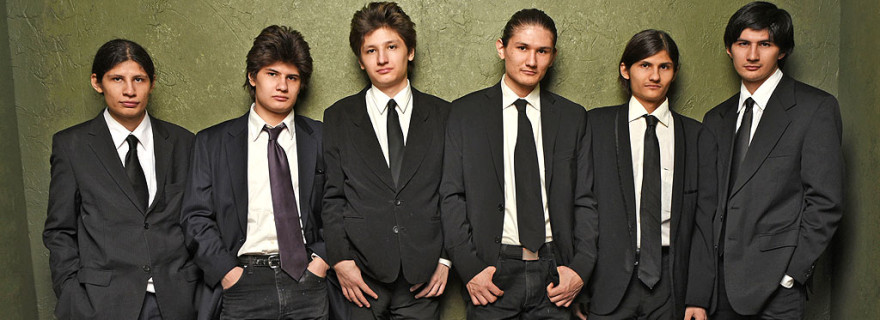'The Wolfpack'
Movie Rating:
3.5
Most great documentaries are found as much as crafted. Crystal Moselle’s Sundance award-winning doc ‘The Wolfpack’ certainly features one of those miraculous subjects that documentarians can spend an entire career hoping to find. It’s a story so bizarre and moving that it couldn’t possibly be scripted. Once seen, it’s virtually impossible to forget.
Moselle found the subjects of her breakout film by simply wandering the streets of New York. She’d built up a career crafting commercials and documentary shorts, when she saw a group of teenagers with hair down to their waists dressed like the cast of ‘Reservoir Dogs’ marching down a sidewalk. She approached them curiously and quickly learned that they were all siblings, born into an extraordinarily controlling home. The teens were rarely ever allowed outside of their apartment, sometimes only a few times a year and sometimes not even once over a twelve month period. Their only fleeting connection to the outside world were the American movies that they binge-watched endlessly, then built remarkable costumes and props out of cardboard to remake the movies on home video. Stories like that don’t come along every day. Obviously, Moselle knew that she had to film the kids and see what developed.
So she did, following the teens around for several years during a remarkable period in their lives. The doc certainly has a certain queasy freak show feeling in the early going. These kids are strange, as is their story. Since they all look and act remarkably similar, Moselle rarely even refers to them by name in the film to avoid confusion. In the almost structureless opening sequences, we simply glimpse their lives. Strange home movie remakes of the likes of ‘Pulp Fiction’ and ‘The Dark Knight’ take up chunks of the running time, and a peculiar tale of an overbearing family dynamic emerges.
The Angulo family’s anti-authoritarian Peruvian father immigrated to America with a distaste for work and a fear of the outside world. He rarely held down a job and refused to let his children outside out of concern that they would become corrupted. The family’s only income came from government assisted financing of their mother’s home-schooling of the six brothers and single sister. The family grew into something insular and ritualistic, yet loving. Despite the father’s overbearing ways, an intense bond formed between the boys and their mother, but obviously the pressure cooker situation they all shared was destined to pop.
Eventually, the eldest son wanted out as a form of rebellion (as well as, you know, a natural desire to interact with the world). At first, this came in the form of a sort of prison escape that concluded with him walking the streets in a Michael Myers mask, hoping he could disappear into the shadows. Obviously that’s not how onlookers interpreted the situation. The police were soon involved, and the boy was assigned to therapy. In the end, the event proved beneficial, as it caused the father to loosen his reins. The boys were all allowed out together, which is exactly when Crystal Moselle discovered them and started filming.
It was an interesting time, a moment when the boys were escaping the past and discovering the world. While the bulk of the first half of the movie is dedicated to simply explaining this strange situation (aided immeasurably by the hours of home videos the family took over the years), the second half is more inspirational. We see the kids grow remarkably over the few years of filming, and even the parents get a chance to tell their emotional side of the story. An arc of growth is built right into Moselle’s doc along with plenty of interesting side tangents – such as how the escape of moviegoing can inform growing imaginations and life. She was there to capture many amazing moments like the boys’ first trip to a movie theater or their mother’s first phone call to her own mother in decades. The results can be pretty fascinating.
That’s not to say that the film is a perfectly crafted piece of work. Unfortunately, that’s not quite the case. At times, Moselle’s wandering direct cinema style can be a little too meandering for its own good. There’s an occasional discomfort surrounding the fact that the filmmaker might be exploiting the lives of her subjects, and some of the big ideas that the director hopes to impose onto her film don’t quite add up. However, these issues tend to pop up in most docs of this style.
Overall, Moselle does a wonderful job of turning this very specific true tale into a genuinely moving film without too much visible editorial manipulation. She stumbled onto a story that needed to be told and a group of film-obsessed outsiders who understood the value of opening up for her camera. The result is something so thoroughly touching, inspiring, funny, sad and painfully real that ‘The Wolfpack’ demands to be seen by anyone tickled by documentaries. A doc this specific and successful doesn’t come along very often. The critical attention that ‘The Wolfpack’ has received thus far is well deserved.




Bolo
This sounds nuts. I’ve got to see this.
Peter
I had not heard of this film before, and now I must see it! Sounds fascinating. When reading the review I thought of the 2009 film Dogtooth about a controlling father that keeps his children locked inside their family compound with wild tales of the dangers outside the walls. It’s very strange, but leaves an impression. It is also a fictional drama, not a documentary like The Wolfpack.